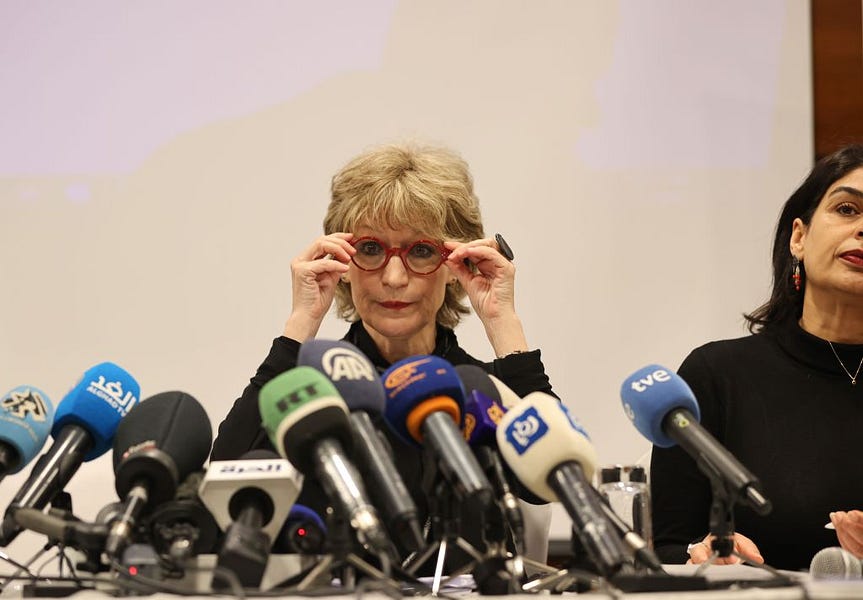The term “apartheid” evokes horrific images from nearly half a century of South African oppression. Given how charged a word it is, it’s imperative that those applying it to other contexts substantiate the allegation with solid evidence. A recent report from Amnesty International fails in that regard.
“Crime of Apartheid: The Government of Israel’s System of Oppression Against Palestinians” clocks in at 280 pages and is full of biased analysis that does not reflect reality on the ground. Still, it’s worth considering how this report fits into the ecosystem of anti-Israel ideas and activism.
Jonathan Schanzer, senior vice president for research at the Foundation for Defense of Democracies, calls the report “antisemitic at its core. It absolutely meets the IHRA definition [of antisemitism], holds Israel to a different standard, twists Israel’s history, and mischaracterizes last May, a defensive war where Israel responded. There’s so much in there, it’s almost hard to unpack all of it.”
Among those problems, Amnesty’s report uses the phrase “Palestinian citizens of Israel,” disregarding that only 7 percent of Israel’s Arab population would describe themselves as Palestinian. The wars of 1948 and 1967 are written about as if Israel had been the aggressor. The Oslo Accords are conspiratorially described as “fragmenting and segregating Palestinians even further to Israel’s benefit.” Just after acknowledging that Israel left Gaza in 2005, the report claims the “Gaza Strip remains under Israeli military occupation,” which would be news to Hamas.
The long-running housing dispute in Jerusalem’s Sheikh Jarrah neighborhood (previously called Shimon HaTzadik)—which became a pretext for last May’s 11-day war between Hamas and Israel—is characterized by claims that Palestinian families are “facing imminent threat of forced eviction from their homes.” However, Israel’s Supreme Court ruled Palestinian families could remain if they paid nominal rent to the Jewish owners; the families declined that deal, though, after hearing from Hamas.
Amnesty hasn’t announced who wrote their report, but Anne Herzberg, legal adviser of NGO Monitor, noted similarities to “arguments … made by former UN Rapporteur Richard Falk, who has a history of antisemitic statements and activities.”
Similarities in arguments between representatives of the United Nations Human Rights Council (UNHRC) and Amnesty are not surprising. The UNHRC has a well-deserved reputation for anti-Israel bias. Israel is the only nation to have its own standing agenda item at UNHRC meetings, which has resulted in 95 anti-Israel resolutions over nearly 16 years.
Agnes Callamard, Amnesty’s secretary general, previously served as a special rapporteur for the Office of the U.N. high commissioner for human rights and “the U.N. Human Rights Council’s ‘expert’ on assassinations.” In 2013 tweet, Callamard falsely claimed former Israeli Prime Minister Shimon Peres “admit[ted]” that Yasser Arafat was murdered. Undermining the semblance of neutrality, Callamard has also appeared beside “the heads of 3 PFLP [Popular Front for the Liberation of Palestine]-linked NGOs … discussing how best to pursue BDS and lawfare against Israel.”
Amnesty’s report has already begun facing pushback. The United Kingdom’s Charity Commission is investigating whether the report was funded by donations and if that poses regulatory problems. Mansour Abbas, leader of Ra’am (the United Arab List) and part of Israel’s current governing coalition, has publicly dismissed the report’s central apartheid label. Amnesty’s report has already been rejected by the U.S. State Department and members of Congress from both parties, including those on the House Foreign Affairs Committee. David Siegel, president of Friends of ELNET, an organization working to strengthen European-Israeli relations, told me “the U.K., Germany, Czech Republic, and Austria … [have] firmly reject[ed] Amnesty’s libelous report.” The report has, however, been welcomed by the PFLP and Rep. Ilhan Omar.
Notably, Tal Gur-Arye, the resource development director at Amnesty International Israel, whose “section was not involved in drafting this report,” felt compelled to criticize it, writing in a Facebook post: “While the report details a large number of human violations, its theoretical framework and methodology, and thus, its conclusions, appear—in my opinion—to be flawed.” Gur-Arye continued, “When we make claims, it is not enough to collect evidence and make a moral statement, but the conclusions must be based on solid analysis. Likewise, terms must be used correctly, which I believe is not the case here.”
South African apartheid had a very specific definition involving one racial group’s oppressing another. However, that definition doesn’t apply to Israel.
NGO Monitor’s Herzberg observed, “Amnesty has invented a singular definition of the crime of apartheid for Israel alone that is not in keeping with international standards. Surprisingly, there is no one definition of apartheid under international law. And the definitions that exist are very vague,” which is why Herzberg recently co-authored a comprehensive analysis on the subject. In short, describing Israel as an apartheid state may not be legally accurate, but it’s strategically useful for Israel’s enemies.
Eugene Kontorovich, director of the Center for the Middle East and International Law at George Mason University Scalia Law School, believes “there is clearly a coordinated campaign by far-left NGOs to mainstream the apartheid accusation, with an eye o[n] getting it adopted and ‘made official’ by the ICC [International Criminal Court] and the UNHRC.” Kontorovich continued, “Having a U.N. agency, even a discredited one like the UNHRC, accuse Israel of apartheid will certainly give diplomatic momentum to those who seek to destroy Israel.”
Herzberg sees Amnesty’s report as “timed to feed into a March 2022 report where U.N. Human Rights Council Rapporteur Michael Lynk will accuse Israel of apartheid, which in turn will serve [as] the basis for the Human Rights Council’s Commission of Inquiry on Israel levying of the charge. They also hope their reports will influence the ICC to indict Israelis for a crime against humanity.”
Schanzer said, “This [report] was designed to be ammunition, and it will be.” Schanzer concluded, “All of this could potentially build in a dangerous direction.”
That direction isn’t an entirely new one. This effort recalls the United Nations’ declaring in 1975 that “Zionism is a form of racism and racial discrimination.” While the United Nations finally repealed that resolution in 1991, Soviet-style anti-Zionism lives on.
Izabella Tabarovsky, senior associate with the Kennan Institute at the Wilson Center and research fellow with ISGAP, told me, “Soviet antizionist propaganda deeply influenced [the] Western left back [in] the 1960s-1980s. Soviet propaganda was comparing Israel to South Africa already in the 1960s and applying the apartheid label regularly … These comparisons were as baseless then as they are today, but they fulfilled a political purpose.”
Anti-Israel activism remains a popular and unifying cause among leftists; it can also imperil local Jews. Tabarovsky observed: “Demonization of Israel and Zionism creates an atmosphere of antisemitic incitement that endangers Jews in the diaspora in very real ways—we saw it last May. … In my research, numerous people told me that demonization of Israel by Soviet press in the run-up to the Six Day War created such an antisemitic atmosphere that they feared for their personal safety. … They were sure that there would be pogroms,” because inflammatory rhetoric has consequences.
Even before releasing this report, Amnesty was an organization whose members voted against actively combating rising antisemitism in Britain in 2015. So Paul O’Brien, executive director of Amnesty USA, can’t be taken seriously when he tweets, “We want to be very clear—it is unacceptable and inappropriate for this report to be used as justification for any recrimination against the Jewish people. We condemn antisemitism in the strongest possible terms.” Indeed, that tweet’s no more credible than Amnesty’s report on Israeli “apartheid.”






Please note that we at The Dispatch hold ourselves, our work, and our commenters to a higher standard than other places on the internet. We welcome comments that foster genuine debate or discussion—including comments critical of us or our work—but responses that include ad hominem attacks on fellow Dispatch members or are intended to stoke fear and anger may be moderated.
With your membership, you only have the ability to comment on The Morning Dispatch articles. Consider upgrading to join the conversation everywhere.